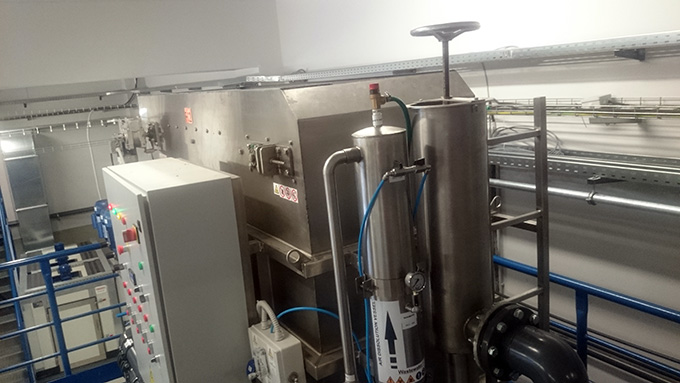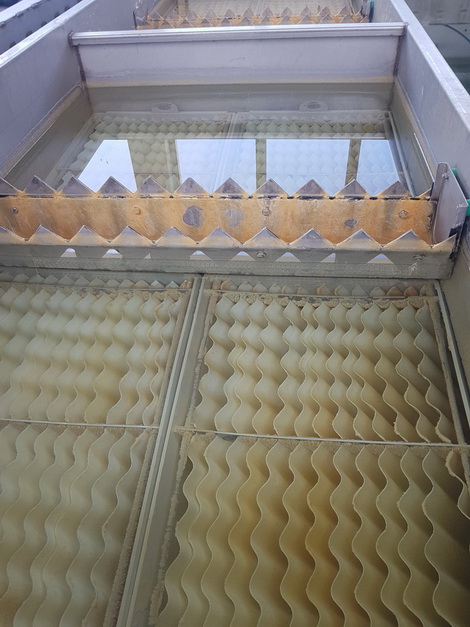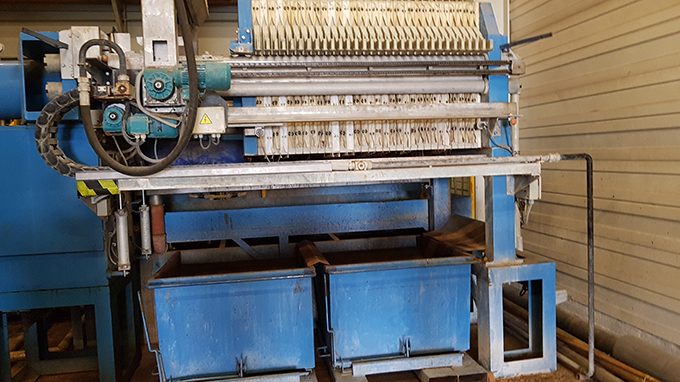Tehnikum was founded in 1990, as an entrepreneurial business, by two graduated technologists, who had already had great experience. Initially, we had a galvanizing line for the application of zinc, chromium, cadmium and so, processing of technical rubber, application of formaldehyde polymers as insulators, and other technological procedures.
We soon expanded our activity to the design and manufacture of equipment for galvanizing line and water purification and filtration, purification of polluted air, development of technology projects, development of technical documentation for the recycling industry, etc.
Tehnikum is now a multidisciplinary team of engineers with decades of experience, who have been in various trainings in the country and abroad, specializing in engineering, providing technological solutions, "transfer" technology, design and manufacture of equipment, in various industries such as:
- Wastewater treatment
- Filtration and preparation of water
- Surface protection of materials: galvanization, preparation lines, paints, electric powder coating-plasticization, hot-dip galvanizing
- Metal industry and metallurgy
- Chemical industry
- Food industry (dairies, cheese production, slaughter industry, meat processing, fruit and vegetable processing, juice production, etc .., water bottling plants, wineries, brewing industry)
- Recycling industry (collection and treatment of non-hazardous and hazardous waste, recycling of steel, aluminum, magnesium, etc., recycling of batteries, recycling of PET, polyethylene, and other plastics)
- Landfills
- Laundries
- Textile industry
- Paper industry
- Leather industry
- Processing of technical rubber
- Production of construction materials
- Production of biogas
- Purification of polluted air.
We provide our partners with optimal solutions in making important decisions in the phase of investment and construction, as well as in the process of its production and provision of services.
To date, Tehnikum has over 1,500 successfully realized requirements of our customers.
All our systems and plants meet the valid European and domestic legal norms and standards.
"TEHNIKUM" PHILOSOPHY
TEHNIKUM success is based on the permanent improvement of engineering and organizational knowledge in the core business - providing technological and technical solutions and services in industry. We promote the success, achievements, optimism of all employees and associates, through new ideas and creativity.
The mission of TEHNIKUM is to provide our clients with the best solutions for their business in order to improve the business of their company with innovative technological solutions, top quality products, and outstanding service, which are the fruit of our knowledge, expertise and experience.
The vision of the company TEHNIKUM is to become a reference name for the best technologies, top product quality, and fast service, in the field of environmental protection, water treatment, air treatment, surface protection of metals.
News
DAF DEVICES
DAF (Dissolved Air Flotation) device is used for separation of dispersed and suspended particles from wastewater. Flotation is a mechanical separation proccess based on making supersaturated air solution in wastewater, meaning that micro bubbles make contact and connect with suspended substances and enable them to reach the surface and float.The air is being dispersed from the bottom of the pool, t it “collects” particles on it’s way up and pushes them to the surface. Coagulant neutralizes the electrostatic load of colloid particles and enables their agglomeration into floccules. Polyelectrolyte connects the neutralized particles into even bigger floccules. Piping saturator has a unique construction and enables air bubbles with dimensions 10-70 micrometers, what provides an extraordinary efficiency. AREAS OF APPLICATION AND MAIN APPLICATIONS Milk industry, ice cream production, juice production, alcoholic beverages production, breweries, fish and meat processing, fruit and vegetables processing, drinking water, etc. Plastic recycling, chemical industry, oil and gas, textile industry, leather industry, laundry services, package washing etc. Advantages of our DAF Systems: - Very high level of reduction of pollution parameters Suspended substances Reduction rate from 90-99% Oils and fats Reduction rate trom 90-99% BPK5 Reduction rate from 70=80% HPK Reducstion rate from 70-80% - Comprehensive and efficient solution which provides high stability and efficient removing of dirt. Reliable method for refining of technological wastewater. - Simple installations provide compact equipment set and saves space. - Major savings because the system construction and technological parameters ensure small consumption of energy, air and chemicals. - Very stable functioning of coagulation, neutralization and flocculation systems. - Law level of turbulences, there is no re-retraction of floating sediments. - We have available a developed digital services package which provides follow-up and optimization of the DAF system long-distance working and remote controllie of thesystems. - Instead of classical lamellas, we use special “U” profiles which provide: Separated flowi of wastewater and clean water Equal distribution of wastewater flow and sectors load, decreasing the turbulence There is no obstruction of flow of flotants Flow leaders secure less consumption of polymers DAF is a device made of stainless steel We can deliver complete systems or rebuild and upgrade existing DAF devices.
Read more
TECHNOLOGICAL TREATMENT PLANT FROM BATTERY PRODUCTION AND RECYCLING WASTEWATER
Type of wastewater: technological wastewater from battery production and recycling Capacity: 700 m³/day, 29 m³/h Table 1: Types of wastewaters and damaging and dangerous substances generated during the production process Types of wastewater Origin Existing hazardous and dangerous matters Alkaline rinsing water Workspace and streets cleaning Lead and dust Sour rinsing water with high concentration Paste mixer and shepherd machine washing Pb, PbO2, PbSO4 Neutral concentrates Wet Ventures - scrubbers Pb, Sn, Sb, hydroxides Water from battery formulation Charging battery with acid Sulfuric acid Water from battery recycling Cutting and emptying of battery Sulfuric acid, Pb, PbO2, PbSO4 Outgoing water quality Purified wastewater from the treatment plant should satisfy the following limit values for discharing into the land waters (in this case a small river). Limit values are extremely low for some hard metals, which are contained in these wastewaters, such as: Cadmium – 0,1 mg/l Lead – 0,5 mg/l Iron – 2 mg/l Sulfates – 250 mg/l Suspended substances – 35 mg/l BPK5 – 25 mg/l HPK – 125 mg/l, etc. The investor’s request was to deliver a technological solution – Technology for wastewater processing through the project: machine, electro and measuring regulating equipment, electro-commanding cabinet with PLC and software, launching and a guarantee that the required parameters will be inside the limit values. Plant working regime: Continually (moze I : non-stop), 24h/7 daysOV generated during he production process are being treated trough three lines: Water line Dirt line Preparation and chemicals dosing line These technologies are being established on the water line: Egalisation Neutralisation Neutralisation II and removing of sulfates Coagulation Flocculation Sedimentation Clarification of sedimented water Final control These technologies are being established on the preparation and chemicals dosing line: Preparing a dosing solution Dosing the solution The system is completely automatized, with support of electro- commanding cabinet with SIEMENS PLC, software and measuring regulation equipment. After the equipment is delivered and the system is launched, chemical analysis of the purified OV have been done in an accredited lab. Those analysis showed that all parameters were inside the limit values.
Read more
MEMBRANE FILTER PRESSES
Filter plates at Mebrane filter press are equipped with membranes that enable additional "squeezing" -dehydration of the filter cake. Increasing the filling pressure ensures precompression and drainage of the filter cake in the chamber. When the filling pressure reaches a predetermined value (approximately 6-8 bar), the filter cake is additionally exposed to the membrane pressure, and additionally "squeezed". Elastic membranes, which can be made of polypropylene (PP) and synthetic rubber (NBR, EPDM), use compressed air to press the filter cake over the entire surface of the chambers. Additional compression thus expels free water through the filter cloth. ADVANTAGES OF MEMBRANE FILTER PRESSES: • More economical filtration due to high degree of drainage and shorter cycle time Maximum flexibility for expansion and automation possibilities Extended pump life in the case of abrasive media, due to low supply pressure CASE STUDY: Delivery of membrane filter press with the dimensions of plates 1000x 1000 mm, 36 plates, volume 770 liters, for filtering the solution of lead "paste" in the process of battery recycling. Investor "TAB MAK". The press is equipped with: membrane plates with EPDM membrane, system for automatic opening of plates, "Squezing" system for additional dehydration of filter cakes, "drip tray" system. Degree of dehydration of filter cakes: 80-90% dry matter..
Read more



